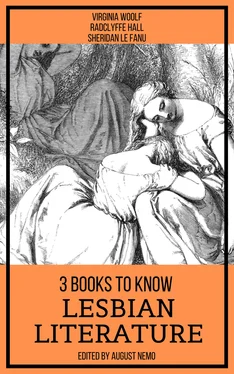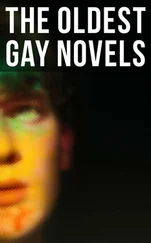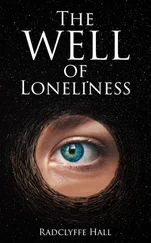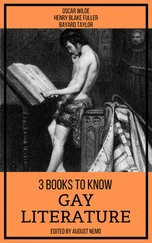What, then, did she hide from him? The doubt underlying the tremendous force of his feelings was like a quicksand beneath a monument which shifts suddenly and makes the whole pile shake. The agony would seize him suddenly. Then he would blaze out in such wrath that she did not know how to quiet him. Perhaps she did not want to quiet him; perhaps his rages pleased her and she provoked them purposely—such is the curious obliquity of the Muscovitish temperament.
To continue the story—skating farther than their wont that day they reached that part of the river where the ships had anchored and been frozen in midstream. Among them was the ship of the Muscovite Embassy flying its double-headed black eagle from the main mast, which was hung with many-coloured icicles several yards in length. Sasha had left some of her clothing on board, and supposing the ship to be empty they climbed on deck and went in search of it. Remembering certain passages in his own past, Orlando would not have marvelled had some good citizens sought this refuge before them; and so it turned out. They had not ventured far when a fine young man started up from some business of his own behind a coil of rope and saying, apparently, for he spoke Russian, that he was one of the crew and would help the Princess to find what she wanted, lit a lump of candle and disappeared with her into the lower parts of the ship.
Time went by, and Orlando, wrapped in his own dreams, thought only of the pleasures of life; of his jewel; of her rarity; of means for making her irrevocably and indissolubly his own. Obstacles there were and hardships to overcome. She was determined to live in Russia, where there were frozen rivers and wild horses and men, she said, who gashed each other's throats open. It is true that a landscape of pine and snow, habits of lust and slaughter, did not entice him. Nor was he anxious to cease his pleasant country ways of sport and tree-planting; relinquish his office; ruin his career; shoot the reindeer instead of the rabbit; drink vodka instead of canary, and slip a knife up his sleeve—for what purpose, he knew not. Still, all this and more than all this he would do for her sake. As for his marriage to the Lady Margaret, fixed though it was for this day sennight, the thing was so palpably absurd that he scarcely gave it a thought. Her kinsmen would abuse him for deserting a great lady; his friends would deride him for ruining the finest career in the world for a Cossack woman and a waste of snow—it weighed not a straw in the balance compared with Sasha herself. On the first dark night they would fly. They would take ship to Russia. So he pondered; so he plotted as he walked up and down the deck.
He was recalled, turning westward, by the sight of the sun, slung like an orange on the cross of St Paul's. It was blood-red and sinking rapidly. It must be almost evening. Sasha had been gone this hour and more. Seized instantly with those dark forebodings which shadowed even his most confident thoughts of her, he plunged the way he had seen them go into the hold of the ship; and, after stumbling among chests and barrels in the darkness, was made aware by a faint glimmer in a corner that they were seated there. For one second, he had a vision of them; saw Sasha seated on the sailor's knee; saw her bend towards him; saw them embrace before the light was blotted out in a red cloud by his rage. He blazed into such a howl of anguish that the whole ship echoed. Sasha threw herself between them, or the sailor would have been stifled before he could draw his cutlass. Then a deadly sickness came over Orlando, and they had to lay him on the floor and give him brandy to drink before he revived. And then, when he had recovered and was sat upon a heap of sacking on deck, Sasha hung over him, passing before his dizzied eyes softly, sinuously, like the fox that had bit him, now cajoling, now denouncing, so that he came to doubt what he had seen. Had not the candle guttered; had not the shadows moved? The box was heavy, she said; the man was helping her to move it. Orlando believed her one moment—for who can be sure that his rage has not painted what he most dreads to find?—the next was the more violent with anger at her deceit. Then Sasha herself turned white; stamped her foot on deck; said she would go that night, and called upon her Gods to destroy her, if she, a Romanovitch, had lain in the arms of a common seaman. Indeed, looking at them together (which he could hardly bring himself to do) Orlando was outraged by the foulness of his imagination that could have painted so frail a creature in the paw of that hairy sea brute. The man was huge; stood six feet four in his stockings, wore common wire rings in his ears; and looked like a dray horse upon which some wren or robin has perched in its flight. So he yielded; believed her; and asked her pardon. Yet when they were going down the ship's side, lovingly again, Sasha paused with her hand on the ladder, and called back to this tawny wide-cheeked monster a volley of Russian greetings, jests, or endearments, not a word of which Orlando could understand. But there was something in her tone (it might be the fault of the Russian consonants) that reminded Orlando of a scene some nights since, when he had come upon her in secret gnawing a candle-end in a corner, which she had picked from the floor. True, it was pink; it was gilt; and it was from the King's table; but it was tallow, and she gnawed it. Was there not, he thought, handing her on to the ice, something rank in her, something coarse flavoured, something peasant born? And he fancied her at forty grown unwieldy though she was now slim as a reed, and lethargic though she was now blithe as a lark. But again as they skated towards London such suspicions melted in his breast, and he felt as if he had been hooked by a great fish through the nose and rushed through the waters unwillingly, yet with his own consent.
It was an evening of astonishing beauty. As the sun sank, all the domes, spires, turrets, and pinnacles of London rose in inky blackness against the furious red sunset clouds. Here was the fretted cross at Charing; there the dome of St Paul's; there the massy square of the Tower buildings; there like a grove of trees stripped of all leaves save a knob at the end were the heads on the pikes at Temple Bar. Now the Abbey windows were lit up and burnt like a heavenly, many-coloured shield (in Orlando's fancy); now all the west seemed a golden window with troops of angels (in Orlando's fancy again) passing up and down the heavenly stairs perpetually. All the time they seemed to be skating in fathomless depths of air, so blue the ice had become; and so glassy smooth was it that they sped quicker and quicker to the city with the white gulls circling about them, and cutting in the air with their wings the very same sweeps that they cut on the ice with their skates.
Sasha, as if to reassure him, was tenderer than usual and even more delightful. Seldom would she talk about her past life, but now she told him how, in winter in Russia, she would listen to the wolves howling across the steppes, and thrice, to show him, she barked like a wolf. Upon which he told her of the stags in the snow at home, and how they would stray into the great hall for warmth and be fed by an old man with porridge from a bucket. And then she praised him; for his love of beasts; for his gallantry; for his legs. Ravished with her praises and shamed to think how he had maligned her by fancying her on the knees of a common sailor and grown fat and lethargic at forty, he told her that he could find no words to praise her; yet instantly bethought him how she was like the spring and green grass and rushing waters, and seizing her more tightly than ever, he swung her with him half across the river so that the gulls and the cormorants swung too. And halting at length, out of breath, she said, panting slightly, that he was like a million-candled Christmas tree (such as they have in Russia) hung with yellow globes; incandescent; enough to light a whole street by; (so one might translate it) for what with his glowing cheeks, his dark curls, his black and crimson cloak, he looked as if he were burning with his own radiance, from a lamp lit within.
Читать дальше












